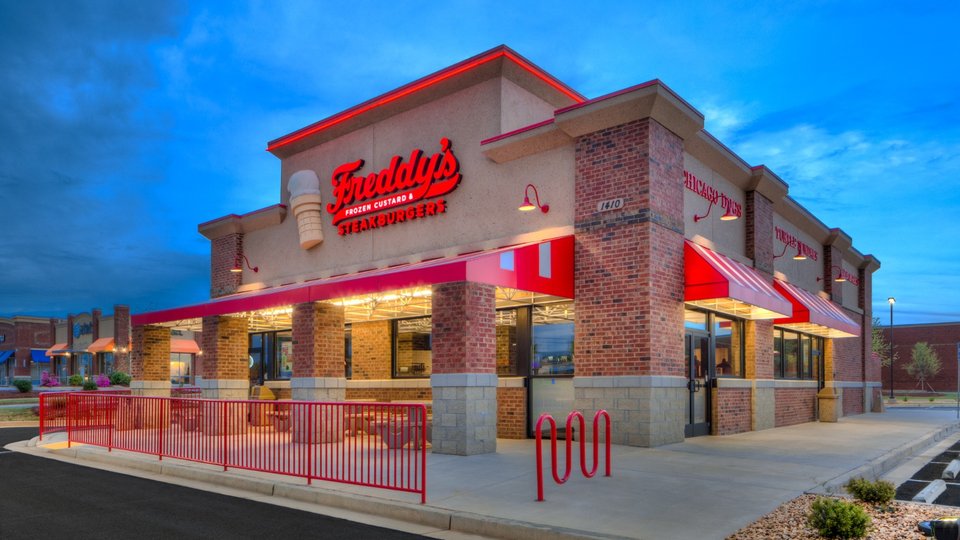Technology
Freddy's taps Amazon's machine learning to analyze data, drive sales
Wichita-based Freddy's Frozen Custard and Steakburgers implemented a machine-learning program via Amazon to gather insights and maximize sales.

May 25, 2021
COVID-19 has uprooted the hospitality sector, leaving many restaurants — including Wichita-based Freddy's Frozen Custard and Steakburgers — to think outside the box as means for survival. At the onset of the pandemic, the 400-unit chain implemented a machine-learning program through Amazon to gather insights and maximize sales, according to Sean Thompson, Freddy's director of information technology. His team used the data to make staffing and operational decisions.
"I can tell you that it cut our decision times down," Thompson said during an interview with FastCasual. "And when you're trying to react, especially in a pandemic, to things like that, the difference of one week could make all the difference."
Powered by Amazon SageMaker Autopilot, Domo AutoML helped Freddy's transform its data into actionable steps, said Bratin Saha, the vice president of machine learning at Amazon Web Services.
"(It) automatically builds, trains and tunes machine learning algorithms based on the restaurant's data while allowing them to maintain full control and visibility," he told FastCasual.
Domo helped Freddy's make predictions, including when to make a hamburger in order for it to be delivered within 10 minutes or ready for pick-up within three minutes. It also assisted with staffing to ensure that a safe and profitable number of employees were on the premises during hours of operation.
"My hope is that we're able to use the data, use the insights and use these systems to make those moments of bliss and comfort when sitting down for a meal more accessible so that everyone can feel that feeling again," Thompson said. "So that each person is getting an experience that is tailored to them and really speaks to them because, man, that's really hospitality."
All's fair in burgers and war
Brian Hughes, a digital media and culture professor at American University in Washington D.C., tied pandemic-related technology trends to those of a war-time effort.
"When there's a war, technology leaps ahead because all this money gets poured into it to support the war," he said during an interview with FastCasual. "All this technology, and sort of focus, means that people are all working toward similar goals. So when you do that, you certainly have improvements."
While digitization benefits customers and businesses alike during these trying times, it certainly has its setbacks for workers, said Hughes, who pointed out that the digitization of labor in the service industry leaves workers vulnerable to just-in-time scheduling and algorithmic management.
"Employers now have the ability to get in touch with employees at a moment's notice," he said. "So on the one hand you have that digital development, and then, on the other hand, you have just these massive improvements in logistics."
As a result, Hughes said operators can process scheduling data more efficiently than ever before, and companies can also generate complex schedules that change on a moment's notice based on how busy the workplace is that day.
What about inherent bias?
Although it's been extremely helpful to Freddy's, Thompson said one possible problem caused by machine learning and artificial intelligence is that they have the potential to magnify inherent biases if not treated responsibly.He described how after feeding it data, the results could indicate that all restaurants in affluent neighborhoods were doing well, for example.
"Then your machine learning is going to come out and say, 'Hey, guess what? Affluent neighborhoods do well for us, and there's no reason why we should invest in lower-income communities.'"
In this instance, Thompson said it was important to remember that data needs to be taken with a grain of salt. Also, only people trained to use the program should have access to pull insights — as some decisions could have "real-life downstream effects on people."
The same idea could be traced back to algorithmic management, which is a huge factor in some restaurants.
According to a March 4, 2021, podcast titled "Tech Won't Save us: How Algorithms are Transforming Work" hosted by Paris Marx and Callum Cant, algorithmic management does more harm than good. The pair said that the absence of a human boss "exposes workers to antagonistic conditions."
For instance, a restaurant using an online ordering system has no limitations in terms of how many orders come in at once. This is a process that previously relied on the coordination of workers and is now managed by a computer — not to mention that the technology allows for workers to be surveilled, tracked and timed.
"There's less room for human — you know — human creativity and problem solving to come out," Hughes said. "We're trying to make robots that think like people, but really what we're doing is we're making people that think more like robots."
For Freddy's, the benefits outweigh the risk, however, so the chain will continue to use Domo as long as workers and customers are happy.
"We've always found that when we focus on our guests, operations and our team members, the profit side will come in and of itself," Thompson said.
 ChatGPT
ChatGPT Grok
Grok Perplexity
Perplexity Claude
Claude












